
U.S. President Donald Trump is touting a ceasefire deal between Israel and Iran, despite what he said were violations of the deal by both sides shortly after he announced it. Trump said he was especially angry with Israel and urged the country to stand down as he faces mounting criticism over the prospect of another U.S. war in the Middle East. “Part of the reason why Trump also was quite eager to get to a ceasefire, why he’s so frustrated with what the Israelis are doing right now, is precisely because he’s very much aware of the strain that all of this has caused within his own support base,” says political analyst Trita Parsi. Parsi says the breakdown of the global Non-Proliferation Treaty on nuclear weapons could lead to dangerous consequences, as countries like Iran see incentive to build their own nuclear deterrence.
Transcript
AMY GOODMAN: Israel’s defense minister has ordered intense strikes on Tehran just hours after President Trump announced a fragile ceasefire. Iran denied the accusations that it violated the U.S.- and Qatar-brokered truce. President Trump spoke to reporters on the White House lawn before leaving for the NATO summit in The Hague this morning. He expressed extreme frustration with both countries, but especially Israel.
PRESIDENT DONALD TRUMP: Israel, as soon as we made the deal, they came out, and they dropped a load of bombs the likes of which I’ve never seen before, the biggest load that we’ve seen. I’m not happy with Israel. You know, when I say, “OK, now you have 12 hours,” you don’t go out in the first hour and just drop everything you have on them. So I’m not happy with them. I’m not happy with Iran, either. But I’m really unhappy if Israel is going out this morning, because of one rocket that didn’t land, that was shot, perhaps by mistake, that didn’t land. I’m not happy about that. You know what? We have — we basically have two countries that have been fighting so long and so hard that they don’t know what the [bleep] they’re doing. Do you understand that?
AMY GOODMAN: F-bombs and real bombs. President Trump also posted on social media, quote, ”ISRAEL. DO NOT DROP THESE BOMBS. IF YOU DO IT IS A MAJOR VIOLATION. BRING YOUR PILOTS HOME, NOW!” unquote.
President Trump first announced the ceasefire on social media Monday in the wake of an Iranian missile attack on the largest U.S. base in the Middle East, in Qatar. Qatar condemned the strike as a, quote, “flagrant violation of Qatar’s sovereignty.” Iran gave advance notice before the strike, and there were no injuries reported. This retaliatory strike followed the U.S. dropping bombs on three Iranian nuclear facilities Sunday and 12 days of fighting between Israel and Iran after Israel launched an initial unprovoked attack.
For more, we’re joined by Trita Parsi in Washington, D.C. He’s the executive vice president of the Quincy Institute for Responsible Statecraft, author of several books, including Losing an Enemy: Obama, Iran, and the Triumph of Diplomacy.
Welcome back to Democracy Now!, Trita. So much has happened in the last two weeks, but let’s talk about the last hours. If you can talk about Israel’s attack on Iran, Iran’s retaliation, then U.S. dropping these bombs, the significance of this, and then supposedly a fragile ceasefire in effect?
TRITA PARSI: I think Trump is discovering the very core of the problem, and I think we can see his frustration here. And the core of the problem, at the end of the day, is that Israel does not want peace. Israel wants to continue this war. Israel wants only unilateral ceasefires in which it is allowed to continue to bomb the countries in question. That’s exactly what it has done in Gaza. That’s what it has done in Lebanon. And he wanted the same thing here. And he wanted to make sure that the United States could not keep itself out of the war that Israel unnecessarily started.
I think there’s a part of Trump that he genuinely wants to get to a deal. I think the manner and the pathways to that that he’s choosing are the wrong ones. But I think he was genuine about getting the ceasefire, staying out of this. We have seen the revolt that has taken place in large parts of his own base. And now he’s discovering that the Israelis, at the end of the day, wanted to drag him to this point in order to keep him in the war, not allow him to get out of the war or not allowing a peace or a ceasefire to break out.
JUAN GONZÁLEZ: And, Trita, I wanted to ask you — we’ve had the reports in U.S. media, clearly, that Iran warned the United States before launching its counterstrike on the U.S. base, but only — there’s been a report by Amwaj.media, which is an operation out of Qatar that covers Iran and Iraq and the Arabian Peninsula, and they claim that the United States warned Iran before the attacks on the nuclear facilities, and as a result, Iran was able to remove most of its enriched uranium, and that there were no casualties on the Iranian side in those attacks. Have you heard anything differently, or do you put much credence in this report?
TRITA PARSI: I do strongly believe this report. Amwaj has proven itself to be one of the absolute top news sites in order that understand what is going on in Iran, and their sources have been completely impeccable.
But I also think that this is actually in — this is in line with past patterns, as well, in which both sides, every once in a while, when they want to do something, but they don’t want it to be too escalatory, they don’t want the situation to get out of control, have given each other direct or indirect warnings. In this case, clearly, the Iranians telegraphed very clearly what they were going to do. The Qataris knew about it long beforehand.
But it was also a way for the Iranians to do something that went beyond what they did after Qassem Soleimani was killed by Trump in 2020, in which they struck U.S. bases in Iraq. This time, they struck it in a GCC country, making it quite different from what it was in 2020, but at the same time, it was nevertheless done in such a way that there would be no casualties, providing the U.S. with no reason to escalate further, rather give both themselves and the United States an exit ramp out of this, which Trump clearly took very quickly, moving towards a ceasefire that he had to impose on the Israelis. And we’re seeing now how unhappy the Israelis are about that.
JUAN GONZÁLEZ: And you said that the current escalation is not about nuclear proliferation. What do you think is the motivation, especially for Israel?
TRITA PARSI: Well, from the Israeli standpoint, for more than three decades now, this has not been about a nuclear issue. It’s been about domination in the region, the geopolitical rivalry that they have with Iran, a significant fear that they have that if the United States and Iran were to negotiate, if they were to strike a deal, reduce their tensions, Iran would end up not necessarily becoming a friend of the United States, but tensions between the U.S. and Iran would reduce significantly without it necessarily reducing Israeli-Iranian tensions, which then would leave the Israelis in a position of abandonment, as they call it. And they would face Iran without having this type of automatic support of the United States.
This is long in the making. If the Israeli concern truly was nonproliferation, then they would have supported Obama’s Iran deal, the JCPOA, because it did close off all patterns for Iran to build a nuclear weapon. But Israel’s preference was and remains an Iran that may have a nuclear weapon, but that is isolated, is at conflict with the United States, whose economy is being crushed, than an Iran that does not have nuclear weapons but has improved ties with the U.S., is trading with the rest of the world, is rehabilitated into the international community and, as a result, can challenge Israel’s position in the region and its aim for military hegemony, even though it does not have nuclear weapons.
AMY GOODMAN: Trita, I wanted to get your comment on Vice President JD Vance. He appeared on Fox News yesterday to tout the long-term effectiveness of U.S. airstrikes on Iran.
VICE PRESIDENT JD VANCE: Our hope is that the lesson that the Iranians have learned here is, look, we can fly a bunker-buster bomb from Missouri to Iran completely undetected, without landing once on the ground, and we can destroy whatever nuclear capacity you build up. I think that lesson is what’s going to teach them not to rebuild their nuclear capacity.
AMY GOODMAN: So, that was the vice president. And if you could elaborate further on why you’re arguing that this U.S. attack on Iran has destabilized the world to, as you say, nuclear countries, nuclear bomb-capable countries, both the United States and Israel, attacking a non-nuclear country, Iran, what it says to other non-nuclear countries around the world, who gets attacked, and who doesn’t?
TRITA PARSI: I think the vice president’s point is not one that needed to be made. I don’t think the Iranians, under any circumstance, were under the illusion that the United States did not have the capability of bombing that facility. Whether they have — whether the U.S. has the capability of truly destroying it or not remains to be seen, because we still have not gotten the final report of what type of damage was done here.
I fear that the conclusion the Iranians will draw, which goes to your second point, is — and not just Iran, many other countries, as well — is that you had here two nuclear-equipped countries attacking a non-nuclear state in the midst of negotiations, despite the fact that none of the nuclear-equipped countries had been attacked by the non-nuclear state. Israel was not attacked by Iran. Israel initiated this conflict. The United States certainly was not attacked by Iran. It initiated this round of attacks. There is no basis for claiming this to be self-defense, even anticipatory self-defense.
What this then says to a lot of other countries, not just in the region, but throughout the world, is that you are completely unsafe vis-à-vis nuclear powers. And if you want to have some sort of an ability to deter nuclear powers from attacking you, you may have to become a nuclear power yourself. So, I think this was a major blow to the Non-Proliferation Treaty, similar to the manner in which many people in Washington argue that Russia’s invasion, illegal invasion, of Ukraine was a blow to the Non-Proliferation Treaty, since Ukraine actually hosted nuclear weapons before the breakup of the Soviet Union. So, if that is the case in the Russian-Ukrainian case, it certainly is the case also in the Israeli-U.S.-Iranian case. So, I think that even though in the short run some limitations may have been put, the Iranian program may have been delayed, I fear that this is going to dramatically motivate the Iranians to build a nuclear deterrence. And it will do so, as well, for other countries in the region, particularly Turkey and Saudi Arabia, and then, of course, beyond the region, as well.
JUAN GONZÁLEZ: And, Trita, what do you make of the reported divisions within the MAGA base over what is happening in Iran? Clearly, President Trump’s scoffing at the Tulsi Gabbard, the director of national intelligence, assessment that Iran is not building a nuclear weapon, and also Tucker Carlson and other key voices of the MAGA movement criticizing what’s going on?
TRITA PARSI: The whole movement toward some form of either confrontation with Iran, as we now have seen by the United States, but also the endorsement and the support that was provided by the United States to Israel’s war of aggression on Iran are things that I think has put a tremendous amount of strain within the MAGA movement and within the Republican Party. The only element of the Republican Party that really genuinely has supported this is the more hawkish neoconservative base, which only has a base in Washington. There’s no constituency for that outside of Washington. The rest of the United States much more falls into the “America first” base of Trump support.
And within that, you can see some very clear strains, because many of these individuals have truly adopted the view that the United States should stay out of these unnecessary wars, that the United States oftentimes is being dragged into these conflicts by some of its allies. And for some time, many of the folks on the right could manage to hold that view but make an exception for Israel. But over the last year or so, I think it’s become clear that that cognitive dissonance no longer was sustainable, because if you make an exception for Israel, mindful of the fact that it is the country most likely to drag the U.S. into another war in the Middle East, at least, then you have kind of negated the principle as a whole. And I think we have seen that cognitive dissonance break down with individuals like Tucker Carlson and others going out long before this, really criticizing the role of Israel in terms of pushing the U.S. into wars.
And now this has happened, we see clearly how betrayed much of that base feels. Now, I think many of them, of course, want to get back into Trump’s good graces, but not without making sure that the U.S. doesn’t get dragged into this war. And I think part of the reason why Trump also was quite eager to get to a ceasefire, why he’s so frustrated with what the Israelis are doing right now, is precisely because he’s very much aware of the strain that all of this has caused within his own support base.
AMY GOODMAN: And, Trita Parsi, we want to thank you for being with us, executive vice president of the Quincy Institute for Responsible Statecraft, author of several books, including Losing an Enemy: Obama, Iran, and the Triumph of Diplomacy. Al Jazeera, by the way, is reporting Palestinian Authority has demanded a ceasefire deal announced in the Iran-Israel war be widened to include the ongoing conflict in Gaza.
Next up, it’s Primary Day here in New York. Will Democratic Socialist state Assemblyman Zohran Mamdani beat former Governor Andrew Cuomo in New York City’s Democratic mayoral primary? Mamdani will join us from the campaign trail as people go out to vote today. Stay with us.
[break]
AMY GOODMAN: “Black Spartacus Heart Attack Machine,” by Tom Morello in our Democracy Now! studio.

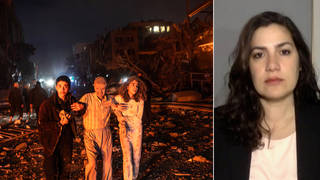
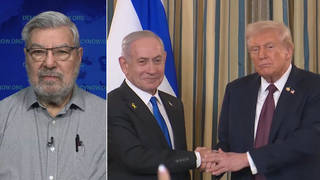
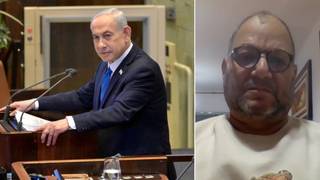
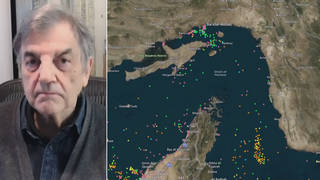

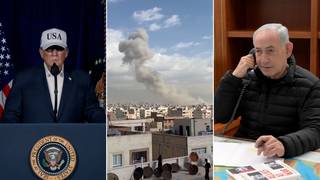



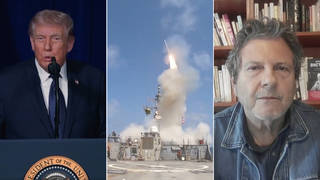
Media Options